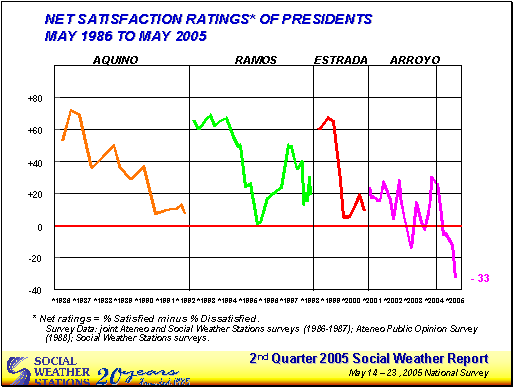It is not unusual for the President of this country to grant convicts executive clemency. It is part of the pardoning power of the President as Chief Executive. No less than the 1987 Philippine Constitution provides that power for the President to exercise judiciously. Article VII, Sec. 19 states: “Except in cases of impeachment, or as otherwise provided in this Constitution, the President may grant reprieves, commutations, and pardon…”
But when the convict of the Chapman-Hultman murder case, Claudio Teehankee Jr., was released on the night of October 3 through the executive clemency granted by Gloria Macapagal-Arroyo, the grant raised a howl of protest not only from the victims’ families but also from the people who believe that justice was cheapened.
"It came out of the blue. We had no warning at all that this has happened, that this will happen, that this was in the process of happening,” Vivian Hultman, mother of the murdered Maureen Hultman, was quoted as saying. “When we heard of the report, it was done already. He was pardoned and already out of prison. And it was a big shock. And then, just this feeling of disgust and anger."
Opposition spokesman Atty. Adel Tamano also criticized GMA’s granting of executive clemency to Claudio Teehankee, Jr., saying that there are other prisoners who deserve to be pardoned. Without rejecting altogether the President’s power to grant executive clemency, Tamano believed that GMA misused that power. “Bakit siya ang binigyan ng pardon? There must be other more deserving persons. Why him in particular? Is it because mayaman siya? O may koneksiyon siya?,” Tamano asked.
Many people thought that the loud protests that came shortly after Teehankee’s release had only served to cement the belief that in this country there is a double standard justice. It goes by various names: compartmentalized justice, selective justice, etc. (Go, take your pick.) This kind of justice essentially means that there is one set of laws for the rich and powerful and another set for the poor and powerless although they are the same laws. Worse, in a society where compartmentalized justice persists, laws can be so lenient when it comes to the rich and influential, but stringent when it comes to the poor and powerless.
Is Claudio Teehankee, Jr. a beneficiary of compartmentalized justice? Claudio Teehankee Jr.’s brother, former Justice Undersecretary and currently Philippine Representative to the World Trade Organization Ambassador Emmanuel Teehankee, said his brother is by no means a beneficiary of compartmentalized justice. He refuted the claim that his brother was released because they have connections to the Malacañang. His brother’s release went through legal processes. Nothing was “hasty” and “sneaky” contrary to the Hultmans’ claim.
If indeed it was legal and nothing was dubious about the executive clemency GMA gave, how come it was met with protests here and there?
The problem I think lies not on who was pardoned, but rather on who gave the pardon. Up to today, GMA’s legitimacy has been severely questioned. Aside from that, among the previous presidents since 1986, GMA is the most unpopular one. A Social Weather Station poll released in July this year showed that her approval rating hit its lowest point, garnering a pathetic negative 38 points. The people’s low confidence on the administration, plus the numerous controversies and less than impressive performance is at the heart of the stirrings spurred by the executive clemency GMA gave to Claudio Teehankee, Jr.
[caption id="attachment_87" align="aligncenter" width="513" caption="Source: SWS"]
 [/caption]
[/caption]If you are unpopular, it makes your decisions unpopular, too. If the people do not like you, it’s hard for the people to see the goodness in the things you do. Even if you do something right, the people would only hurl blanket criticisms of your actions.
But GMA is not alone. Look at what is happening to USA’s George W. Bush. In the August 2008 double issue of Newsweek, Fareed Zakaria wrote a cover essay titled “What Bush Got Right,” wherein he talked about the right things the [Bush} administration somehow managed to do amidst the American people’s perception of Bush as a failed president.
Zakaria said of Bush’s least acknowledged accomplishment particularly in foreign policy: “The foreign policies that aroused the greater anger and opposition were mostly pursued in Bush’s first term: the invasion in Iraq…many of these policies have been modified, abandoned, or reversed…the foreign policies in place now are more sensible, moderate and mainstream.” But still, “no matter what he [Bush] does or whatever happens in the world,” Zakaria said, “the public seems to have decided that Bush has been a failure.”
The same thing can be said of GMA. No matter how her army of apologists desperately tries to convince the people that she works hard, that she cares for the poor, and that she sincerely does all she can do for the welfare of the country, the public seems to have decided not to give credit where credit is due. Bush and Arroyo must console each other by sending this =) or this :D.

[...] Clemency, popularity, and GMA presidency « Youthphemism A Social Weather Station poll released in July this year showed that her approval rating hit its lowest point, garnering a pathetic negative 38 points. The people’s low confidence on the administration, plus the numerous controversies … [...]
ReplyDelete